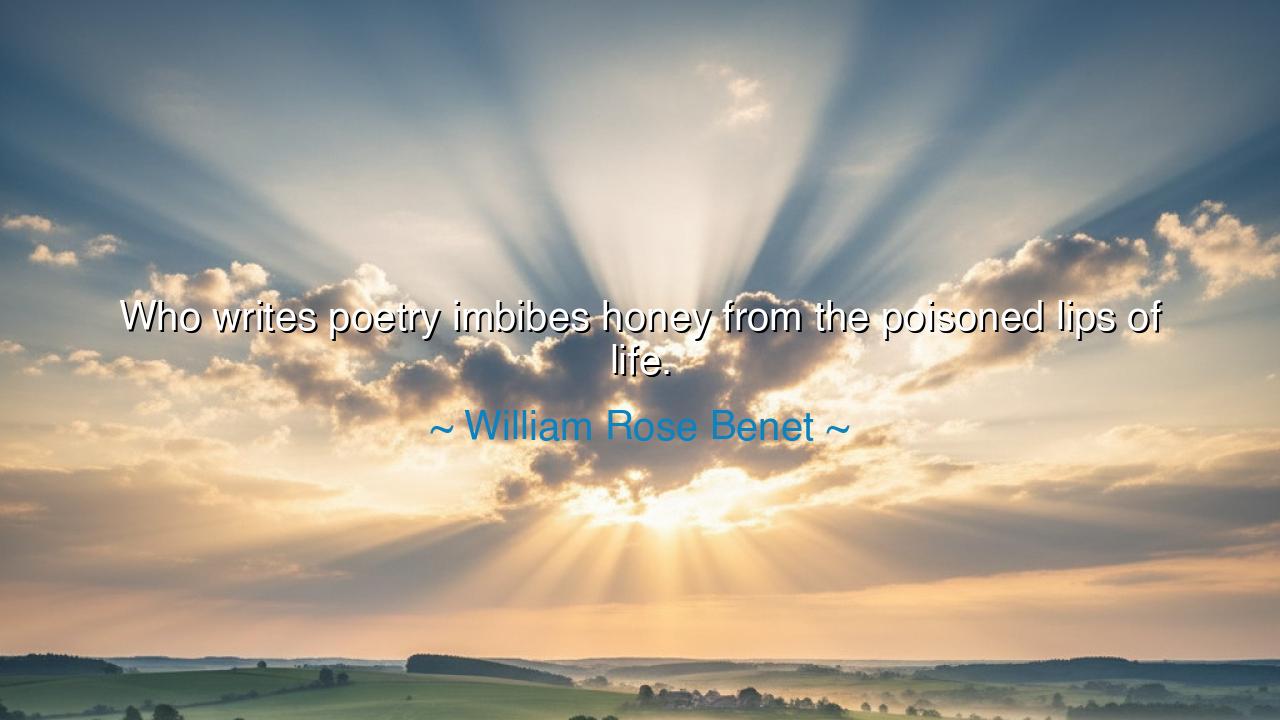
Who writes poetry imbibes honey from the poisoned lips of life.






“Who writes poetry imbibes honey from the poisoned lips of life.” Thus speaks William Rose Benet, in a line that glows with paradox, for it reveals the double nature of existence and of art. To write poetry, he tells us, is not to live in innocence, untouched by suffering, but to drink deeply from life’s bitterness and transform it into sweetness. The poet is one who bends to the cup of sorrow, tastes the poison, and by some secret alchemy of words, renders it into nourishment for the soul.
The meaning of this saying lies in the recognition that poetry is born not from ease, but from struggle. The poisoned lips of life are the moments of grief, loss, betrayal, and mortality that every human being must endure. These wounds, though painful, become the very source of the poet’s song. The honey is the beauty that emerges when suffering is transfigured into art—sweetness drawn from bitterness, hope distilled from despair. Thus, the poet is both wounded and healer, both sufferer and singer.
Consider the life of John Keats, who knew illness and early death. Stricken with tuberculosis, he wrote some of the most radiant verses in the English tongue, even as he coughed blood onto his sheets. From the poisoned lips of his short life, he drew the honey of Ode to a Nightingale and To Autumn, poems that carry an immortal sweetness. His suffering was not erased, but his ability to transform it into music gave him a kind of victory, and it gave us a gift that outlives him.
The origin of Benet’s imagery lies in the ancient understanding of art as catharsis. The Greeks knew that tragedy, though filled with pain, purified the heart through pity and fear. The audience, like the poet, drank from the poisoned cup and yet found release. This paradox runs through all traditions: in the Psalms of David, lament becomes praise; in the ghazals of Rumi, heartbreak becomes a pathway to God. Everywhere, the pattern is the same—the lips of life may be poisoned, but the poet’s task is to draw honey from them.
The lesson here is clear: do not flee from sorrow, for even your grief contains the seed of sweetness. If you write, if you sing, if you create, dare to face the poisons of life—your losses, your fears, your mortality. From them, draw words, draw music, draw truth. In this way, your wounds need not destroy you; they may instead become the source of healing for yourself and for others.
History gives us also the story of Maya Angelou, who endured unspeakable trauma and silences in her youth. Yet from those poisoned years, she drew the honey of poetry that uplifted millions. In her voice, the bitterness was not hidden but transmuted. Her suffering did not vanish, but it became the soil out of which her power grew. She drank from the poisoned lips of life, but in her poems, she gave us nectar.
The practical teaching is this: when life wounds you, do not waste the wound. Do not cover it only with distraction or bitterness. Instead, turn to expression—whether through writing, speaking, painting, or music. Let your pain become a vessel of sweetness, let your scars become songs. In doing so, you will not only heal yourself, but you will offer nourishment to others who are wounded.
Thus the teaching endures: the poet is one who knows the taste of poison but gives to others the taste of honey. This is the ancient labor of art: to turn suffering into sweetness, to lift sorrow into song, to remind humanity that even in its darkest hour, beauty may still be drawn from the poisoned lips of life.






CNChi Nguyen
I’m fascinated by the tension in this statement. How does one reconcile the delight of artistic creation with the toxicity it draws from? Does this metaphor suggest that living fully, with all its dangers and disappointments, is a prerequisite for producing meaningful poetry? I also wonder whether this consumption of poisoned honey is transformative, corrupting, or enlightening. Does the poet’s engagement with life’s bitterness make their work more authentic, or does it risk being tainted by the very poison they ingest?
HNThi hong Nguyen
This makes me reflect on the bittersweet nature of creativity. Is the honey meant to represent beauty, insight, or emotional release, and is the poison the suffering, injustice, or loss that gives it depth? I also question whether readers taste the honey without recognizing the poison behind it. Does this quote imply that the poet’s role is to mediate between the harshness of reality and the sweetness of expression, offering both caution and pleasure to the audience?
HDHai Duy
I feel both intrigued and disturbed by this image. If poetry draws from life’s poisoned lips, does that imply that true art is inseparable from struggle, danger, or even moral ambiguity? Could it be that the act of writing poetry is inherently a confrontation with life’s harsh realities, making the creative process both intoxicating and perilous? I also wonder how this idea resonates across different poets and eras—do all great poets inevitably engage with life’s darker elements?
THphan trong hai
This metaphor is striking and unsettling. It makes me wonder about the paradox of poetry—finding sweetness and inspiration even in life’s pain or toxicity. Does this suggest that poets are uniquely attuned to suffering, extracting beauty from bitter experiences that others might avoid? I also question whether this act of transformation—turning poison into honey—is a conscious choice or an innate sensitivity. How does this perspective shape our understanding of the emotional depth and moral responsibility of poets?